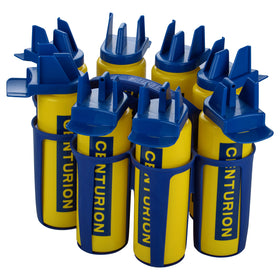Rugby Blog
Nutrition in Rugby
by Leana Kell
If you're serious about rugby, maintaining a healthy diet will count towards your performance on the rugby pitch. Your diet should be an important part of your daily routine, after all, if you want to get the best out of your body, you need to be feeding it with the right things.
Heavily processed foods, alcohol and refined sugars are all types of food that can lead to poor performance. The best course of action to achieve maximum performance is to fill your diet with unprocessed, fresh foods.
Below, Centurion takes a look at three of the essential elements you should consider eating as part of your rugby training diet:
Protein - Protein is one of the most important elements within a rugby player's diet. If you can't achieve the recommended amount of protein through your normal diet, one way to increase your protein intake is to create protein shakes which allow you to top up your protein levels. Most rugby players should be looking to consume between 1.5 - 2 grams of protein per kg of body weight to enable them to sustain muscle strength, growth and health.
Saturated fat - A large intake of saturated fat is unhealthy for a rugby player and should be avoided as it can cause unwanted fatigue. Small amounts of saturated fat are okay as they are required to protect organs in the body and provide part of our fuel source.
Carbohydrates - A diet rich in carbohydrates is essential for rugby players. Carbohydrates are necessary for maintaining vital energy levels, although make sure the source of your carbohydrates is chosen carefully to avoid excessive sugars and salts. A rugby player in training normally requires around 7 grams of carbohydrates per kg body weight.

The Foods
Below we take a look at which foods contain the right levels of protein, carbohydrates and saturated fats to achieve the correct balance in diet for rugby players. Centurion has created a list of suggested foods, but remember, these should always be consumed in moderation.
Breakfast:
Eggs - eggs are an excellent choice for rugby players at breakfast time. Remember to cook the eggs healthily; boiled eggs or poached eggs are the best choice. Eggs are an excellent source of high-quality protein, ideal for athletes looking to sustain a lean body mass and rebuild and/or strengthen muscle.
Oats - porridge can be made using low-fat milk or water and topped with a handful of berries for additional flavour. Blueberries in particular contain high levels of protective nutrients to stop premature ageing. Oats are high in fibre so they release energy slowly, so rugby players will be less likely to experience energy highs and lows throughout the day.
Lunch & Dinner:
Broccoli - is the perfect vegetable for detoxifying the body as it aids liver function, increases antioxidant protection and helps the body to recover quickly. Vegetables such as broccoli are a good source of nutrition for rugby players who need to fight off infection. Broccoli can also encourage a speedier recovery following a match. Team broccoli with a selection of other healthy vegetables to achieve the maximum desired effect.
Beans & pulses - beans and pulses are not only good for slowing down digestion and allowing your means to go further, they also count as part of your five a day. Pulses are high in fibre and a good source of protein, which helps to promote muscle strength and healthy digestion. Many beans and pulses also contain magnesium which helps muscles to relax and recover.
White meat - white meats such as chicken and turkey are very lean protein and can be healthy if cooked in the correct manner, for example, grilling white meat will provide you with a good source of protein and is a low fat food - you can add some spices to make the dish more tasty. Spices such as garlic, oregano, chilli pepper, turmeric and paprika are all anti-inflammatory and immune-enhancing.
Salmon - is one of the best sources of protein for athletes. One of its main components is omega-3 fatty acids which protect the heart by reducing blood clotting factors and lowering triglycerides and blood pressure. Salmon also contains lean, high-quality protein that is easily digested and it is low in saturated fat.
Pasta & brown rice - whole wheat pasta and brown rice are classed as unrefined carbohydrates and therefore release energy more slowly than simple carbohydrates, so are better for rugby players who are in training. Consume foods containing carbohydrates approximately 3 hours before play begins to achieve the best results.
Sweet Potato - contains beta carotene and is higher in carbohydrates than normal potatoes. Sweet potatoes provide good starch for energy and are also another slow carbohydrate which means they take longer for the body to breakdown and are therefore useful for rugby players enduring long periods of play.
Drinks:
 Water is the best drink you can have if you want to remain fully hydrated, and we'd recommend that rugby players consume plenty of it to avoid the affects of dehydration. Becoming dehydrated can have a bad effect on different areas of the body, particularly during prolonged periods of exercise when the body loses excess moisture through breathing and sweat. In addition to water, rugby players could choose a sports drink, which includes a special combination of electrolytes designed to replenish the vital components that can be lost during exercise.
Water is the best drink you can have if you want to remain fully hydrated, and we'd recommend that rugby players consume plenty of it to avoid the affects of dehydration. Becoming dehydrated can have a bad effect on different areas of the body, particularly during prolonged periods of exercise when the body loses excess moisture through breathing and sweat. In addition to water, rugby players could choose a sports drink, which includes a special combination of electrolytes designed to replenish the vital components that can be lost during exercise.




